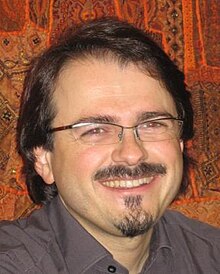Luca Chiantore
Luca Chiantore | |
|---|---|
 | |
| Background information | |
| Born | 1966 (age 57–58) Milan |
| Occupation(s) | Pianist and musicologist |
| Website | https://chiantore.com |
Luca Chiantore (born 1966)[1] is an Italian pianist and musicologist, based in Catalonia. He has a PhD in Musicology from the Universitat Autònoma de Barcelona;[2] he specializes in the study of piano technique and interpretation and the music of Beethoven.[3]
As a scholar, his most important studies are: Tone Moves: A History of Piano Technique (2019),[4] a revised English version of his Historia de la técnica pianística (2001)[5] (+250 cites on Google Scholar[6]), where he introduces the new term Ur-Technik (21 cites on Google Scholar[7]) as corporal correspondent to Ur-Text, and his thesis Beethoven al piano: Improvisación, composición e investigación sonora en sus ejercicios técnicos (2010) [8] (30 cites on Google Scholar[9]), where he argued that Beethoven might not have been who composed the Füre Elise.[10][11]
He is very often invited to give lectures at many universities around the world as in the University of California Los Angeles,[12] Universidad de la Rioja, Spain[13] or the Universidade de São Paulo.[14]
Luca Chiantore teaches in the Escola Superior de Música de Catalunya (Barcelona),[15] Universidade de Aveiro (Portugal), Universidad Complutense de Madrid (Spain)[16] and the Escuela Superior de Música Reina Sofia (Spain).[17]
As a pianist, Luca Chiantore has performed, either as soloist or with David Ortolá in the Tropos Ensemble, in many countries as at the Oratorio San Felipe Neri in Cuba,[18] Palacio Rioja in Xile,[19] Auditorio de la Usina del Arte in Buenos Aires, Argentina[20] or the Carnegie Hall in New York, USA[21][22]
He has been awarded with the Second Prize of the Valencia International Piano Competition Prize Iturbi in 1990.
References
[edit]- ^ "Luca Chiantore on Herder". Editorial Herder México. Retrieved 20 May 2023.
- ^ "Luca Chiantore on INET". Instituo de etnomusicologia. Retrieved 20 May 2023.
- ^ "Luca chiantore on ORCID". ORCID. Retrieved 20 May 2023.
- ^ Chiantore, Luca (June 2019). Tone Moves: A History of Piano Technique. Catalonia: Musikeon Books. ISBN 9788494511738.
- ^ Chiantore, Luca (2001). Historia de la técnica pianística: Un estudio en torno a los grandes compositors y el arte de la interpretación en busca de la Ur-Technik. Spain: Alianza. ISBN 9788420678955.
- ^ "Google Scholar". scholar.google.com. Retrieved 21 May 2023.
- ^ "Ur-Technik cites on Google Scholar". scholar.google.com. Retrieved 21 May 2023.
- ^ Chiantore, Luca (2010). Beethoven al piano: Improvisación, composición e investigación sonora en sus ejercicios técnicos. Spain: Nortesur. ISBN 9788493735760.
- ^ "Google Scholar". scholar.google.com.
- ^ Wiegelmann, Lucas. "Ist "Für Elise" gar nicht von Beethoven?". Die Welt. Retrieved 20 May 2023.
- ^ "Who Wrote "Für Elise"?". Newyorker.com. Retrieved 20 May 2023.
- ^ "Music Performance Studies Today: "21st-Century Pianism: Retrospection, New Directions, and Interpretative Communities"". schoolofmusic.ucla.edu. Retrieved 21 May 2023.
- ^ "International Conference Performing Eighteenth-Century Iberian Music". unirioja.es. Retrieved 21 May 2023.
- ^ "University Of São Paulo: Italian Pianist Exhibits Beethoven's "Moonlight Sonata" At USP". indiaeducationdiary.in. Retrieved 21 May 2023.
- ^ "Luca Chiantore". esmuc.cat. Retrieved 21 May 2023.
- ^ "Doctorado en Musicología". ucm.e. Retrieved 21 May 2023.
- ^ "Área académica". escuelasuperiordemusicareinasofia.es. Retrieved 21 May 2023.
- ^ "Concierto del pianista italiano Luca Chiantore, en el Oratorio San Felipe Neri". habanacultural.ohc.cu. Retrieved 21 May 2023.
- ^ "Pianista italiano Luca Chiantore presentará concierto en Palacio Rioja". pucv.cl. Retrieved 21 May 2023.
- ^ "Diálogo de partituras". clarin.com. Retrieved 21 May 2023.
- ^ "Tropos Ensemble". donyc.com. Retrieved 21 May 2023.
- ^ "Classical Music Listings for Nov. 27-Dec. 3". nytimes.com. Retrieved 21 May 2023.
